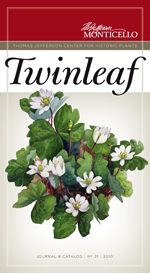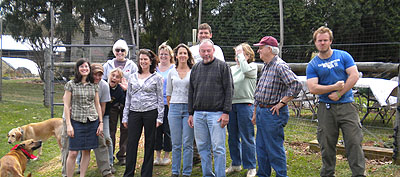 The days were getting longer. The sparrows and cardinals rallied around the birdfeeders as the bluebirds darted in from he trees along the fence line. Snows had blanketed the fields, retreated, and then came again. While the world outside slept, nestled among pastures with Monticello looking down from a westward ridge sat CHP, eagerly awaiting another growing season.
The days were getting longer. The sparrows and cardinals rallied around the birdfeeders as the bluebirds darted in from he trees along the fence line. Snows had blanketed the fields, retreated, and then came again. While the world outside slept, nestled among pastures with Monticello looking down from a westward ridge sat CHP, eagerly awaiting another growing season.
It has been quite an eventful year already. As if preparing for our Open House with wine, roses, music, and dear friends weren't enough, we received a record snow fall this January and February that brought out the best in everyone. With snow shovels flying, we dug ourselves out and told plenty of "when I was a kid" stories. With all the hot air, it was amazing that we had to dig at all.
As December turned to January, our dedicated team of volunteers did no less than the miraculous. CHP packages more than 30,000 seed packets every year. These seed packets are available at the Monticello Museum Shop and our online store. We rely almost entirely on volunteer labor to help accomplish this daunting task. The steady commitment of individuals like Marie Taylor has been an inspiration to us all. Like clockwork, every Wednesday morning she arrives ready to work. As always, the conversations around the packaging table have been lively. The indomitable Janet Eden has kept us all smiling, while Maureen Mikolajczak has kept us well fed, coordinating several pot lucks already this year with a Christmas Party not to be forgotten. As usual, Dennis Whetzel, our manager, stole the show with his flan and English war bride cookies (definitely not for calorie counters). His skill in the kitchen is rivaled only by his expertise on historical plants.
We also enjoyed a special visit from Anner Whitehead, one of our country's foremost experts on Irises, in preparation for the 15th anniversary of the Iris collection. Her colorful articulations and total command of her subject were a special treat for the volunteers during our soup and bread pot luck. All of which were warm and delicious. It was the perfect thing for a crisp January afternoon.
 With the turn of a calendar page hanging on the old barn wall, we welcomed February and readied ourselves for "the big push." Although we started to seed many of the plants we offer in January, February is when we swing into full gear. Bonnie McKenzie kept a watchful eye over thousands of little seedlings poking their heads up through the soil. With Old Man Winter still blowing chills through our bones, the greenhouse was showing spring the way. Life is full of many simple pleasures, and surely tables full of tiny green leaves on their way to becoming snail flowers, columbine, and foxglove must be chief among them. The hummingbirds and daffodils couldn't be far behind now.
With the turn of a calendar page hanging on the old barn wall, we welcomed February and readied ourselves for "the big push." Although we started to seed many of the plants we offer in January, February is when we swing into full gear. Bonnie McKenzie kept a watchful eye over thousands of little seedlings poking their heads up through the soil. With Old Man Winter still blowing chills through our bones, the greenhouse was showing spring the way. Life is full of many simple pleasures, and surely tables full of tiny green leaves on their way to becoming snail flowers, columbine, and foxglove must be chief among them. The hummingbirds and daffodils couldn't be far behind now.
And finally spring, dressed in her finest trappings, found her way north to us. With her came the migrating birds to already crowded feeders. The more the merrier. Perhaps they were just as anxious for a new season of Saturdays in the Garden as we were. Events start in March and a schedule is available online. Tom Burford, of pear and apple fame, will kick things off with a workshop on apple grafting. Also, Peggy Cornett and Peter Hatch will begin their guided tours along woodland paths, once walked by Thomas Jefferson, in search of wildflowers and ferns.
As the days warm, our staff and volunteers turn their attention to the gardens, which must have missed us as much as we've missed them. Cleaning, weeding, pruning, and mulching, we keep our charge caring for plants that date back centuries and further. It is a rare privilege that is lost on no one. Surrounded by the magic of Monticello, steeped in history, you can take time to smell the roses that have stirred the hearts of poets and kindled romance for generations.
Plants are a true living legacy that literally brings history to life. As you touch their leaves and enjoy their colors and fragrance, our shared history moves from the imagination to the immediate and we experience the natural world intimately, just as our fathers before us. To quote one of our nation's most famous horticulturalists, "Cultivators of the earth are the most valuable citizens. They are the most vigorous, the most independent, the most virtuous, and they are tied to their country and wedded to it's liberty and interests by the most lasting bands," Thomas Jefferson. So it was then, and so it is today.
As we look to the future, CHP is planning several upgrades and improvements to our facilities and collections. As we install raised beds for our dianthus collection and continue to improve the terraced beds of our historic irises, we also are implementing some much needed modernization of the greenhouse including roll top benches and a bench warmer system. The improvement s to the greenhouse will dramatically increase the amount and quality of the plants we offer for purchase and the cultural conditions of the unique specimens preserved here. By greatly expanding the usable area in the greenhouse we will be able to offer more educational and curatorial opportunities. Any assistance with these projects would be enormously appreciated. Together, The Thomas Jefferson Center for Historic Plants and you can continue to protect and preserve our horticultural legacy so that these plants may never perish. For once they are gone, they are gone forever. We offer our deepest gratitude and hope to see you soon.
